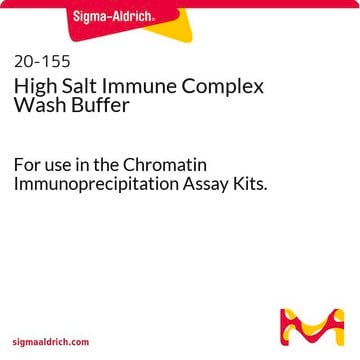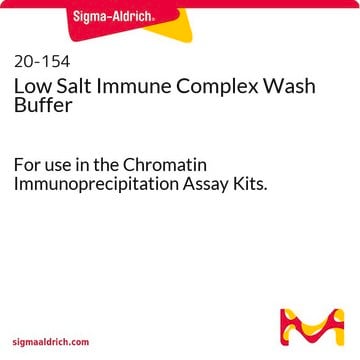20-156
LiCl Immune Complex Wash Buffer
For use in Chromatin Immunoprecipitation assays.
Sign Into View Organizational & Contract Pricing
All Photos(1)
About This Item
UNSPSC Code:
41116012
eCl@ss:
32160405
NACRES:
NA.41
Recommended Products
Application
LiCl Immune Complex Wash Buffer has been used in chromatin immunoprecipitation assays.
Physical form
0.25M LiCl, 1% IGEPAL CA630, 1% deoxycholic acid (sodium salt), 1mM EDTA, 10mM Tris, pH 8.1.
Storage and Stability
1 year at 4°C
Legal Information
UPSTATE is a registered trademark of Merck KGaA, Darmstadt, Germany
Disclaimer
Unless otherwise stated in our catalog or other company documentation accompanying the product(s), our products are intended for research use only and are not to be used for any other purpose, which includes but is not limited to, unauthorized commercial uses, in vitro diagnostic uses, ex vivo or in vivo therapeutic uses or any type of consumption or application to humans or animals.
Storage Class Code
12 - Non Combustible Liquids
WGK
WGK 2
Flash Point(F)
Not applicable
Flash Point(C)
Not applicable
Certificates of Analysis (COA)
Search for Certificates of Analysis (COA) by entering the products Lot/Batch Number. Lot and Batch Numbers can be found on a product’s label following the words ‘Lot’ or ‘Batch’.
Already Own This Product?
Find documentation for the products that you have recently purchased in the Document Library.
Geminin Orchestrates Somite Formation by Regulating Fgf8 and Notch Signaling.
Huang, et al.
BioMed Research International, 2018, 6543196-6543196 (2019)
TH 17 cells contribute to uveitis and scleritis and are expanded by IL-2 and inhibited by IL-27/STAT1
Amadi-Obi, et al.
Nature Medicine, 13(6), 711-718 (2007)
Minghui Chen et al.
PloS one, 14(8), e0221506-e0221506 (2019-08-24)
Expression of FosB gene in striatum is essential in addiction establishment. Activated glucocorticoid receptors (GRs) induce FosB gene expression in response to stressor. Therefore, elevation of FosB expression in striatum serves as one mechanism by which stress increases risk for
Stella M Ranuncolo et al.
The Journal of biological chemistry, 287(28), 23549-23561 (2012-05-19)
The RNA polymerase II C-terminal domain (CTD), which serves as a scaffold to recruit machinery involved in transcription, is modified post-translationally. Although the O-GlcNAc modification of RNA polymerase II CTD was documented in 1993, its functional significance remained obscure. We
Christopher M Dundas et al.
Applied microbiology and biotechnology, 97(21), 9343-9353 (2013-09-24)
Streptavidin and its homologs (together referred to as streptavidin) are widely used in molecular science owing to their highly selective and stable interaction with biotin. Other factors also contribute to the popularity of the streptavidin-biotin system, including the stability of
Our team of scientists has experience in all areas of research including Life Science, Material Science, Chemical Synthesis, Chromatography, Analytical and many others.
Contact Technical Service






